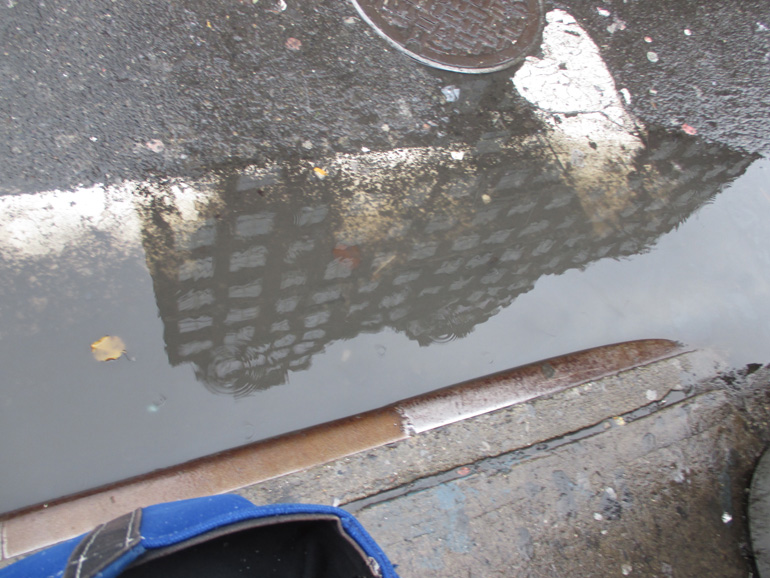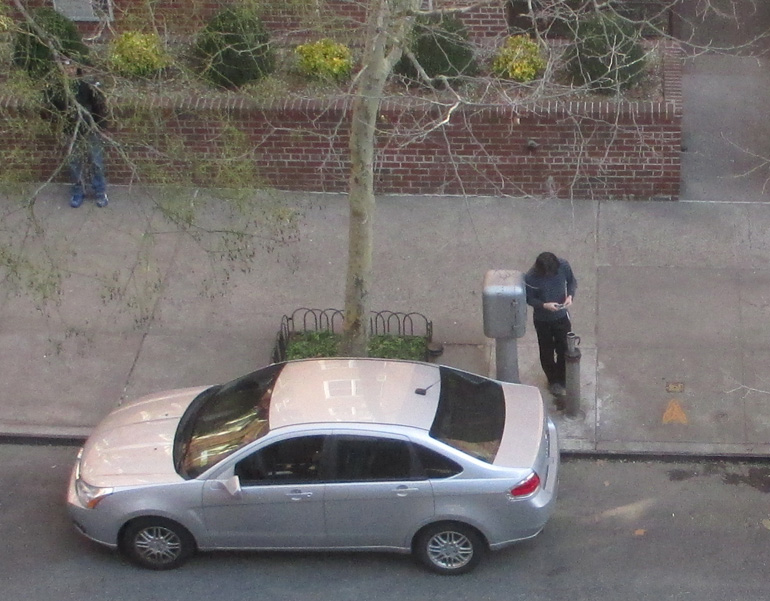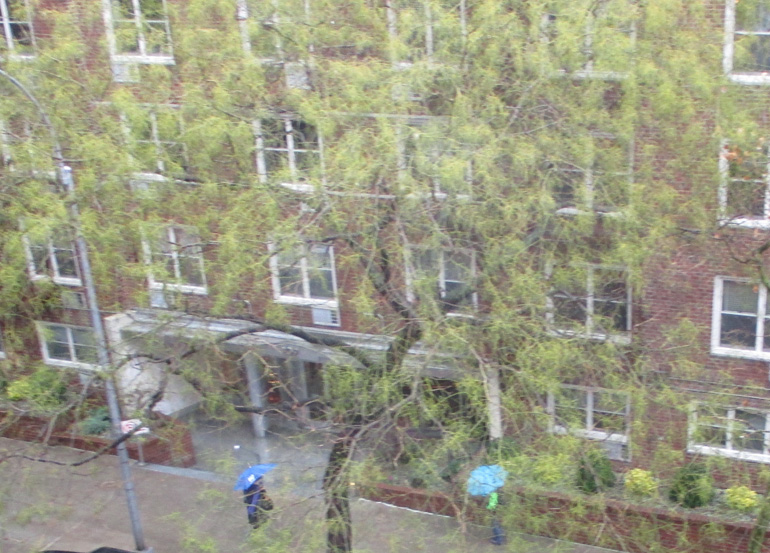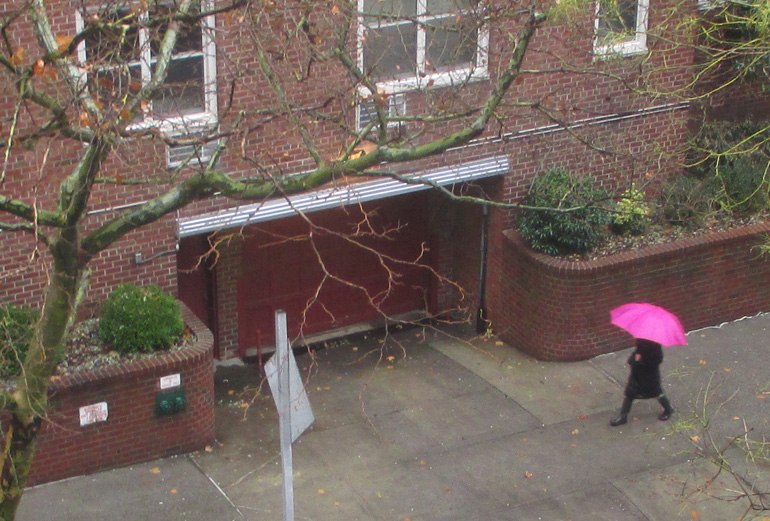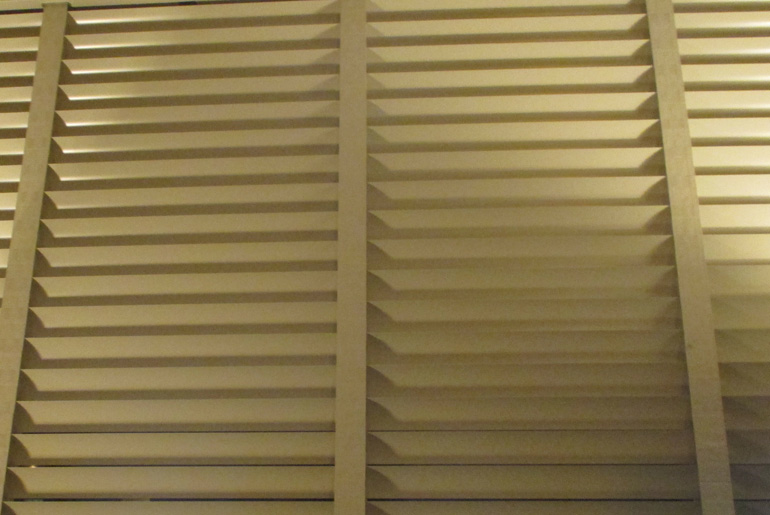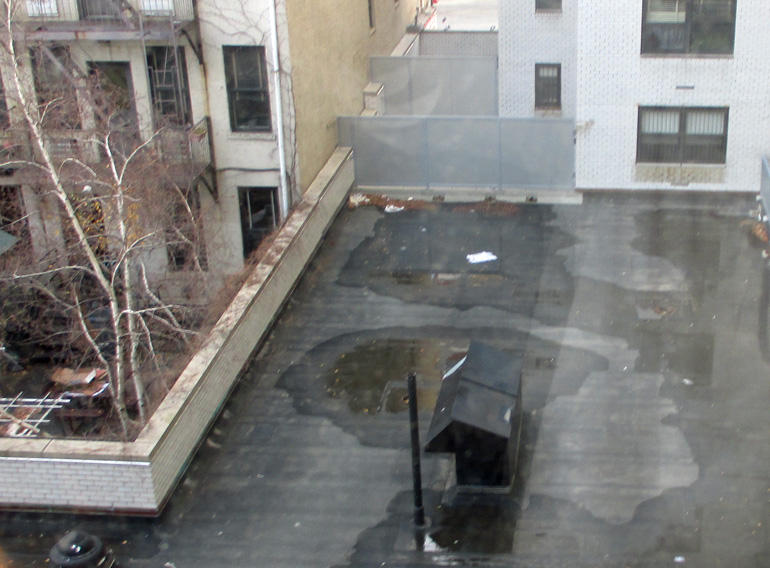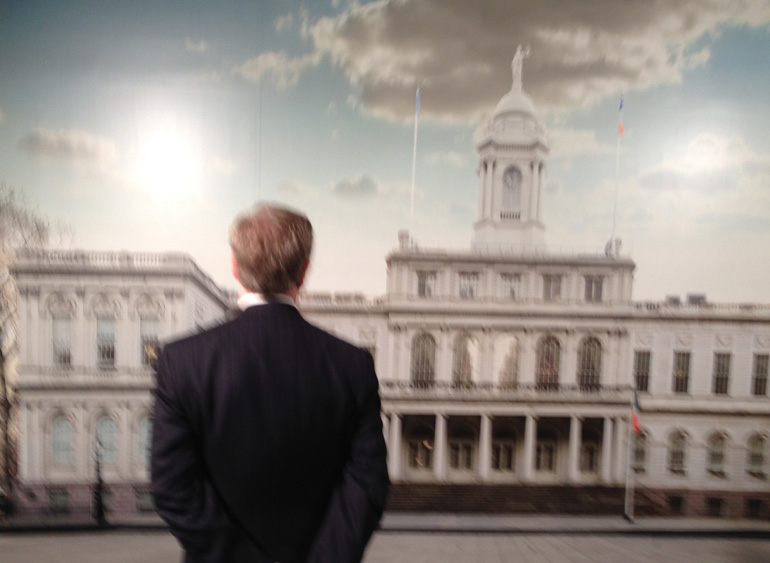Holiday Dispatches:
New Year, Indeed
24-29 December 2014
Friday, December 26th, 2014
Gaspingly late, early Christmas morning
Our lovely tree doesn’t look like this anymore. It has been covered with ornaments, beautifully decorated by Kathleen and Ray Soleil. The tree looks so good, in fact, that I can only think that we must have a party, so that everyone we know can come to see it. But I know that that’s not what’s important for Kathleen. She doesn’t need an audience.
We had a lovely Christmas Eve dinner. I was very ambitious. We began with a ravioli dish that would have been super had the ravioli been cooked enough; they were slightly underdone. The salmon mousse course was a complete success, perhaps because no cooking was involved. Then there was a break. I sent all the diners back out into the living room — Kathleen and Ray to decorate the tree, Fossil to do something undetermined with his smartphone — while I prepared the main course, Beef Stroganoff. A moderate success, I must say; no more. Then the bûche, about which the less said &c. A great Christmas dinner, however. Kathleen and Ray decorated the tree as though they’d grown up together.
***
Boxing Day
And that was all that I could manage to write, late Wednesday night. I composed it, as if out of stone blocks, while the dishwasher took care of the pots and pans. By the I gave up and left the book room, the dishwasher was ready for the china and glassware. I managed not to break anything.
Yesterday, I was not particularly capable. Without complaint, however, I got dressed and paid visits. On the way our friend who lives near Hunter College, I left my very nicest wool cab in the taxi. I’ve been trying out various means of tracking it down, but right off the bat I can tell you that the nice people at 311 don’t have the correct phone number for the company that owns the medallion attached to the cab in which I lost my personal property. Nor, armed with the company’s name, could I find a phone number on the Internet. I still haven’t decided whether to pay $50 to post an ad with a Web site that promises to help out with these problems. The hat is certainly worth more than — it comes from Paul Stuart. It’s worth more than twice that, which would cover a nice reward. But is the ad site legitimate?
I remembered to water the tree just now. Another thing that I had to remember was to take a Christmas envelope down to the doorman on duty. But he was off having lunch. I’ll try again in half an hour.
Shortly after darkness falls, Kathleen and I will make our way to a Boxing Day party in the Seventies.
This is not one of those holiday seasons when I feel so out of sorts that I wish I could simply sleep through it all. Nor is it quite one of those warm and lovely times that I’ll remember forever — although, come to think of it, I don’t remember the good times distinctly; they mash up together into a pleasant omnibus. This holiday, in fact, I may remember just for itself, because it has been neither awful nor transcendent. Our first Christmas in the new apartment, it has had a provisional feeling, but only around the edges. We had a real Christmas Eve dinner, just as at the best of times, and we have a lovely tree. We’ve listened to Messiah a dozen times at least (we’ve got several recordings), and we’re not yet sick of Christmas songs. We have yet to send out a single calendar (our version of a Christmas card — Kathleen chooses twelve of her best photographs and sends them off to Vista Print), but that will get taken care of on Monday. And of course there are still the fifteen boxes of books that settled into furniture-like configurations two weeks ago. I do wish we had curtains in the living room. Such are this year’s imperfections. Most people wouldn’t notice them.
On Wednesday, New Year’s Eve, we’ll have friends from Geneva to lunch, and then we’ll pack for our flight to San Francisco in the morning. The day before my birthday, we’ll be back at home. It turns out that my birthday, 6 January, is no longer the Feast of the Epiphany. Except occasionally. On the liturgical calendar, it has been shifted from the fixed date to the first Sunday after what used to be the Feast of the Circumcision, now the Feast of the Holy Family. At least, so I am told by our friend the deacon. I expect that this is an American, or Anglophone usage. The feast has long been a Holy Day of Obligation in Canada (where the Feast of the Immaculate Conception is not), and I’m told that Mexico also clings to the traditional date of Twelfth Night. Like so many practical American arrangements, the reassignment of the Epiphany has a strong odor of gimcrackery.
***
Time Passes
Suddenly, it is days later. Sunday evening, to be exact. What I’ve been up to is easily reported: a party on Friday, followed by dinner at Orsay, always very nice. We keep it special by pretending that it is more expensive than the restaurants closer to home. Perhaps it is, by a very small percentage. Kathleen did have Dover sole.
Yesterday, I did nothing. I cleaned up at some point, but I never got properly dressed, and I never made the bed. The day was entirely devoted to purging the holiday excesses.
Today was what yesterday ought to have been: a quiet afternoon of tidying up.
Throughout these days, I have been reading either Penelope Fitzgerald’s The Beginning of Spring, which I finished last night, or one of my books about Oxford. I had always known that Oscar Wilde said something about wishing that he could live up to his collection of “blue china” — blue and white, presumably — but I didn’t know, or shouldn’t have had a place to store the detail, that he said it whilst a student at Magdalen, and that the quip “went viral,” adding to the evidence that probably determined the masters of Oxford to refrain from offering Wilde anything like a permanent post at the University. “Later,” writes David Horan in Oxford: A Cultural and Literary History, “[Wilde] would boast that the Vicar of St Mary’s opened a sermon with:
When a young man says, not in polished banter but in solemn earnestness, that he finds it difficult to live up to the level of his blue china, there has crept into the cloistered shades a form of heathenism which it is our bounden duty to fight against and to crush out if possible.
Heathenism! What a delicious euphemism!
Wilde was, as usual, making an important, if, indeed, heathenish, point. For nearly two thousand years, the futility of Christ’s example as a practical matter had been demonstrated by nearly every life. Might it not be better — more practicable, more purposeful, more attainable — to emulate the standards set by rigorous craftsmen? Craftsmen aren’t so much as they do. Rather than trying to be perfect, as Jesus was, we ought to pursue perfection, as the artisans of the Kangxi period so evidently did. From the New Testament, we learn a lot about how hard it is to be good. But we’re not taught, in any meaningful sense of learning, how to be good. We’re told that following a set of rules isn’t enough — Jesus is very clear about that. There is no recipe or formula for goodness. Paul, who is much more forgiving, urges everyone to love everyone else, but this is not only difficult but unnatural: given some of the everyones out there, it seems hardly desirable to spread one’s love evenly. Nothing is said about the duty to make ourselves lovable. To be told that God loves us just the way we are is not helpful. God is not the problem.
The other day, Roger Cohen published an Op-Ed piece in the Times, complaining that everything is now the same everywhere.
I traveled several thousand miles recently from London to Singapore. There I found myself on Orchard Road, that vast temple dedicated to the worship of the global brand, a tropical and air-conditioned Oxford Street. I wondered why I had bothered. Nothing to be bought there in the Asian city-state was any different from what could be bought in the glittering streets of the British capital, where billionaires like to bivouac.
We travel within closed loops, taking our worlds with us on devices. If the deep absorption of place requires the setting aside of the place one has come from, it has grown infinitely rarer. That in turn means the diminishment of discovery, which demands the vigilance of the senses. Without discovery the spirit withers.
Cohen begins by trying to be shocking: he praises the smoky atmosphere of a hotel in Berlin where smoking is still permitted. What Cohen doesn’t see is the irony of his craving. Without discovery the spirit withers. That’s as may be, but the notion that travel ought to involve discovery is more arguable. It used to be unavoidable, and the discoveries were often unpleasant — sometimes even fatal! It’s hard to believe that a gentleman of 1850 would not have regarded the likeness of Orchard Road to Oxford Street as a triumph of civilization. As, in its awful way, it really is, for the idea once rather visionarily shared only by affluent Anglophones is now a universal: without outlets of Gucci and Prada, there can be no civilization!
The argument that the triumph here is one of imperialism is an empty one. Now that the expanses of the globe are no longer governed from a handful of European and American capitals, the intrinsic value of consumer society is starkly shown to be very high: everybody wants to be able to afford it. The intellectual heirs of those inspired Victorians have perhaps outgrown the initial objective, as I think Wilde foresaw. What we have to discover in this life is something to live up to.
***
Monday, Return to
I should have liked nothing better than to stay in today, partly for comfort and partly from fear. The comfort part, on a cold day, even a sunny one, at the cold nadir of the year, ought to be perfectly understandable (message to young’uns: it will be!), but the fear is something that even I have yet to work out. All I know is that it’s a combination of age, or the consciousness of ageing, and the persistent surprise, lined with disbelief, that I have landed in this apartment.
The consciousness of ageing is not personal. Last night, I put two things side-to-side for Kathleen. The first was a Pitkin Guide, Morse in Oxford. The second was the jewel box containing Season 8 of Lewis. Both show Kevin Whately making pretty much the same sort of face — a strange blend of unbending moral rigor and profound human sympathy — but this simply emphasizes the work of time. On the Pitkin cover, he is as smooth as a cupcake. On Season 8, it’s Laurence Fox who is smooth (though not as a cupcake); Whately can only be likened, in comparison to his younger self, to a toad. That sounds nasty, but I don’t mean it to be. Rather gloriously, in fact, the pair of photographs manifests an assured humility: Whately’s face is still the one that he was born with. He remains very much the man within, where comparisons to his younger self declare growth, not age.
When I was young, Katharine Hepburn looked middle-aged. In her movies from the late Thirties and the Forties, she seemed magically youthful — magically, because I hadn’t been there to see it. I’ve been watching Kevin Whately since A Murder Is Announced, in which he looked decidedly boyish. There is no magic in seeing that singular episode of Miss Marple now: I was there. And yet, even more time has elapsed.
***
The problem that I’m having with Penelope Fitzgerald’s late novels is that their excellence, their extraordinary agility, is almost ephemeral, because the books are so short. It took no time at all to read The Gate of Angels, which I loved while I was reading it but now have trouble remembering, only a few hours later. I have trouble remembering why I liked it. I still remember why I liked — loved — Innocence: I was captured by its insouciant but quite genuine Italian quality; the novel deserves an entry in that catalogue, Sprezzatura. The Beginning of Spring did not appeal to anything like the same extent. I felt, not without chuckling amusement, as though Ivy Compton-Burnett were taking over the translation of a Russian classic from Constance Garnett. If Innocence struck me as echt, The Beginning of Spring felt pastiche. This distinction is simply a reflection of my very different regard for things Italian and Russian. To me, Russia is a version of the Wild-West United States that hasn’t got the sense to use the Latin alphabet. My dislike of the prelates of Orthodoxy is unsurpassed, at least by other dislikes.
What did interest me about The Beginning of Spring was its strange echo of imperialism. The hero, Frank Reid, is British by background but Russian by birth. Frank was educated in Russia and speaks perfect Russian. Had the setting been India, this fluency would have been unlikely, as would have been the local education. The management of a printing works is an almost stereotypically imperial sort of business, but whatever its commercial activities might have been, Britain never subjected Russia to its yoke; on the contrary, Russia ran its own empire, and vied with Britain for mastery in Central Asia. All the clichés of empire — the alluring, the dangerous, the unintelligible, the backward — are present in The Beginning of Spring, but they are set in what in music would be called a remote key.
With its English setting — London and Cambridge, also in 1912 — The Gate of Angels is extremely familiar, more familiar than it might be if I hadn’t read all the mystery novels of Charles Todd last year. The fictional enterprise of creating a fictional Oxbridge college for the purposes of satire is as comfortable as my favorite napping blanket — and that’s a problem. This is where I think the novel undercuts itself: there is no need in this love story for the extremity of St Angelicus College, and the gratuitousness of the creation is highlighted at the finale, when Daisy Saunders, ever the capable conscientious nurse, violates the college’s male-only hygeine, explicitly likened to that of Mount Athos, in order to relieve the “syncope” of the blind master, whom she finds prostrate at the foot of the tiny quad’s solitary tree. The dons who cluck at her presence are ineffectual hens, and it turns out that Fred Fairly, the junior fellow whose passionate devotion to Daisy powers the plot, is not even on the premises. St Angelicus gives Fitzgerald the pretext for a delightful retelling of the synopsis of La Favorita, the opera about antipope Benedict XIII, only (tellingly) without the Favorite. But that’s about all it’s good for. The solidly stimulating writing about the (quite real) Cavendish Laboratory makes the imaginary college even flufflier.
Now that I’ve dissed The Gate of Angels, I remember, and like, it better.






